-
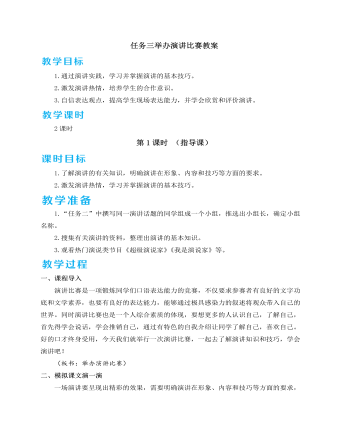
人教部编版语文八年级下册任务三举办演讲比赛教案
本环节通过评委宣布比赛规则和评分细则,为下面比赛活动中,学生学会欣赏和评价演讲打下基础。三、八仙过海赛一赛(主持人组织演讲比赛)演讲比赛的程序:1.各组参赛同学抽签,确定演讲顺序。2.参加比赛的同学按照顺序进行演讲,每位选手演讲完毕,评委现场打分。3.评委根据评分细则评分,去掉最高分和最低分,记分员核算出选手的平均分,并由主持人公布最后得分。4.每位参赛者演讲结束,评委和教师进行简要点评。5.第二轮由每组得分最高的选手进行即兴演讲拉票,决出班级前三名。6.主持人宣布比赛结果。7.活动结束。【设计意图】本环节通过演讲比赛和评价两个活动的交互进行,让学生进一步理解演讲技巧的具体运用方法,从而提高演讲能力。在整个演讲活动中,学生组织活动和实施活动的能力可以得到充分地展现和发挥。四、尺短寸长评一评1.精彩的演讲结束了,在这次演讲比赛中,给你留下深刻印象的演讲有哪些?请说明理由。(生自由发言,对演讲活动进行总结评价)2.在这次精彩的演讲比赛中,大家有哪些收获?请结合活动过程具体来谈。
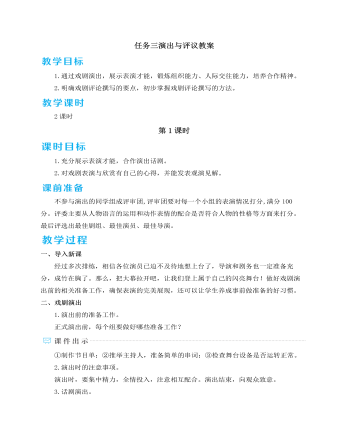
人教部编版语文九年级下册任务三演出与评议教案
从以下话题中任选其一(也可自选话题),写一篇作文,谈谈自己对剧本和戏剧表演的认识。不少于600字。①我为什么对“他”印象最深②舞台说明不只是“说明”③戏剧冲突面面观④台词应该怎样说⑤肢体语言很重要⑥配角也要演到位⑦“好戏”是配合出来的2.技法点拨。①写作时,结合对剧本和戏剧表演的认识,发表自己的见解和看法,力求明白晓畅,切勿写得深奥晦涩难懂。②阐述认识时,要列举剧本和戏剧表演的实例进行分析,便于读者理解和信服。③涉及把握不准的专业术语需查阅相关资料、典籍,规避错误,以免误导读者。④明确提出观点,筛选典型事例作为依据,分析材料与观点之间的关系。师:无论是选择哪一个话题,都要结合具体的实例进行分析,不能只列条目而无内容。针对某一戏剧或谈人物,或谈舞台说明,或谈矛盾冲突,或谈肢体语言,或谈相互配合等;也可以针对某个话题,列举多部戏剧中具体的一句、一段话,或一幕。
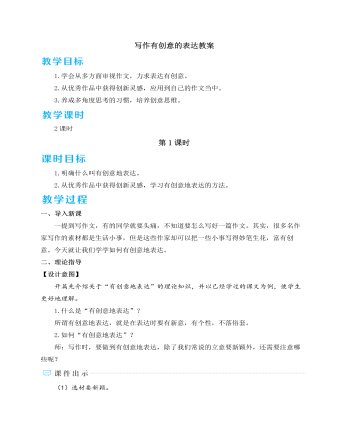
人教部编版语文九年级下册写作有创意的表达教案
1.题目具有开放性,可以实写,也可以虚写。展开联想和想象,将自己想到的全列出来,然后再从中确定写作重点。2.从题目看,可以灵活选择文体。比如,可以以写景或抒情为主,也可以进行议论,或者虚构一个故事等,要力求有创意。3.注意表达上的创新,丰富的词语、恰当的修辞等,都可以为文章增色。2.写作指导。(1)审题立意。本题具有开放性,有实虚两重意义。展开联想和想象,可以写实,也可以写它的象征意义,还可以实虚结合。“春天的色彩”既可以指现实中的春天的各种色彩,也可以指象征意义中的“春天”带着“色彩”(以表达某种心情)。如自然的春天、社会的春天、心灵的春天等等。(2)文体选择与表达。在文体方面,可以写成写景或抒情的散文,也可以写议论文,或者写成表达“春天的色彩”这一主题的记叙文。在表达上应有创新,可以用丰富的词汇、变换的句式、新颖的修辞为文章增色。尤其在作文形式上要有所创新。
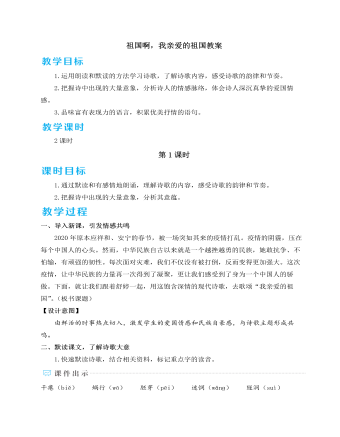
人教部编版语文九年级下册祖国啊,我亲爱的祖国教案
诗歌创作个性十足,难以用统一的规律去分析,然而发掘一些欣赏诗歌的一般性的思路和角度,可以让阅读诗歌有章可循,减少学生读诗时的畏难情绪。在第1课时中,我以朗读为贯穿课堂的抓手,让学生通过思考“怎么读”,自觉地去发现并分析诗歌中的意象,理解诗歌大意,让学生对诗歌有初步的理解和体会。第2课时在整体把握诗歌的基础上,具体去分析诗歌中富有表现力的语言,训练学生深入思考的能力,引导学生梳理诗歌的情感脉络,体会诗中作者的情感变化,理解诗人想要表达的真挚情感,并通过拓展阅读让学生尝试自己解读诗歌,帮助学生巩固所学的阅读诗歌的方法。两节课的侧重点不同,但都围绕这首诗的特点和整体教学思路进行规划,做到“一课一得”。写作背景舒婷初中毕业后下乡插队,后又当过工人。在国家蒙难、人民遭殃的非常岁月,备尝艰辛的舒婷,内心的迷惘、痛苦可想而知。1978年12月,中国迎来了具有重大历史意义的十一届三中全会,开启了改革开放的历史新时期。1979年4月,诗人面对祖国摆脱苦难、正欲奋飞的情景,以自己独有的抒情方式写下了此诗。
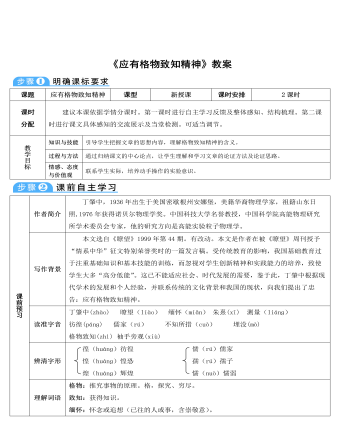
部编版语文八年级下册《应有格物致知精神》教案
【深入研读,探究方法】1.思路清晰、缜密。开头紧扣论题,由“格物致知”的出处,引出对其含义的理解以及我国古代并不重视真正的“格物致知”的原因分析,澄清人们的错误认识;接着作者从实验过程的两个特点、中国学生存在的问题和作者自己的亲身经验三个方面分析真正的“格物致知”精神的重要性;最后指出真正的“格物致知”精神的两个意义,并发出号召。全文思路清晰,说理严密。2.举例论证、道理论证和对比论证相结合,论述充分有力。文章在列举事例时,采用正面事例和反面事例相结合的说理方法。如反面事例,文中第4段举了王阳明“格”竹子的事例,证明了中国传统的教育并不重视真正的格物致知;在第11段摆了中国学生大都偏向理论轻视实验的事实;第12段又举了自己到美国念物理时吃的苦头。
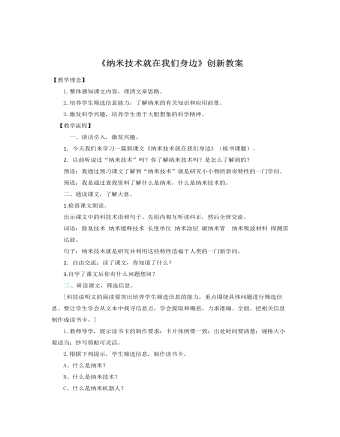
部编人教版四年级下册《 纳米技术就在我们身边》创新教案
【教学理念】 1.整体感知课文内容,理清文章思路。2.培养学生筛选信息能力,了解纳米的有关知识和应用前景。3.激发科学兴趣,培养学生勇于大胆想象的科学精神。【教学流程】一、谈话引入,激发兴趣。1.今天我们来学习一篇新课文《纳米技术就在我们身边》(板书课题)。2.以前听说过“纳米技术”吗?你了解纳米技术吗?是怎么了解到的?预设:我通过预习课文了解到“纳米技术”就是研究小小物质新奇特性的一门学问。预设:我是通过查找资料了解什么是纳米,什么是纳米技术的。二、通读课文,了解大意。1.检查课文朗读。出示课文中的科技术语和句子。先组内相互听读纠正,然后全班交流。词语:除臭技术 纳米缓释技术 长度单位 纳米涂层 碳纳米管 纳米吸波材料 探测雷达波。句子:纳米技术就是研究并利用这些特性造福于人类的一门新学问。2.自由交流:读了课文,你知道了什么?
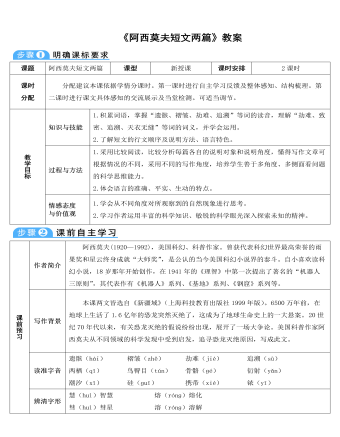
部编版语文八年级下册《阿西莫夫短文两篇》教案
第一部分(第1~4段),提出关于6500万年前恐龙灭绝的问题,目前存在的两种对立的理论,即“撞击说”和“火山说”。第2和第3自然段先后举了两个例子提出了关于“撞击说”和“火山说”这两种观点。第二部分(第5段至全文完),通过对“被压扁的沙子”的反思,证明外星撞击导致恐龙灭绝,支持“撞击说”。这部分又分四层。第一层(第5、6段),说明关于恐龙灭绝的原因不仅仅是一个学术问题,我们以后也许还会遇到这种情况,因此,科学家们一直都在努力寻找证据来验证这两种理论。第二层(第7~10段),说明1961年一位苏联科学家发现了“斯石英”,并且介绍了它的性质,为下文佐证“撞击说”奠定了基础。第三层(第11~13段),说明斯石英不仅可以在实验室制造,而且它在自然界中是可以存在的,不过它们只出现在沙子被强烈挤压的地方。由此推断撞击是可以产生斯石英的。事实也证明,火山喷发是不会产生斯石英的,从而进一步佐证了“撞击说”。

人教版新目标初中英语七年级下册How was your weekend教案2篇
Teaching Goal:1. General aims:Talk about recent past events2. Particular aims:A. Language Focus.Talk about recent past events and think of the past events.B. Language goalsHow was….?It was …What did …do over the weekend?C. Language structures:(1). How was your weekend? I was great. Pay attention to no form.(2). What did you do over the weekend? I played soccer. We went to the beach.D. Useful words and phrases:Words: was, did, went, beach, over, project, test, wasn’t, false, number, geography, spend, week, most, mixture, their, had, little, cook, read, saw, change, everyone, sit, sat, no, anythingPhrases: did one’s homework, played soccer, cleaned my room, went to the beach, played tennis, went to the movies, on Saturday morning, over the weekend, cook … for, what about, do some reading, have a party, talk show, go shoppingE. Grammar language:Present simple past tenseRegular and irregular verbsF. Learning strategies:Tour and holidaysG. Interdiscipinary:H. Emotion and manner:Teaching time: 5 periodsTeaching procedures:Period One教学步骤、时间 教师活动 学生活动 媒体应用Step 1Free talk 3’ Ask some questions like:Who’s on duty today?What’s the weather like? Answer and talk about something.让同学们回答下列问题1. Do you like weekend? (Let some students answer)It takes them three minutes to talk about the question.2. Why do you like weekend? (let the students answer) Most of the students like the weekend此时教师用汉语问:“在周末期间问你干了什么?这句话用英语这么回答?Let the students guess.At last the teacher give them right answer3. What did you do over the weekend?(板书、学习)
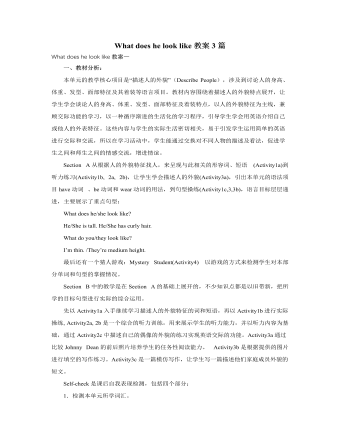
人教版新目标初中英语七年级下册What does he look like教案3篇
所需要用到的句子:Who is that?That is Jack. I like him.Why do you like him?I like him because he is interesting.Task 4: 设计理想中的人类Step one: 设计理想中的人类的外貌。把全班同学分成若干小组,学生可以边说边在纸上画出他们的模样。Step two: 设计理想中人类的性格。学生们可以把那些能描述性格的单词写在图画的旁边。Step three: 每组选出一名同学,其他同组同学提问,他作简单回答,并说明原因。所需用到的句子:What does he or she look like?He or she ...What is he or she like?He or she is ...Why?Because ...Task 5: 挑战性活动调查性格是天生的还是后天形成的,让每个同学回家去调查一下自己成长过程中性格是否有变化,具体是怎样的,为什么会这样? Teaching Aims:1. Enable students to have a general understanding of how to talk about people's physical appearance.2. Enable students to tackle some essential vocabularies and patterns about describing people. Provide them with necessary skills and methods.3. Create various chances for students to describe the persons they're familiar with, such as classmates, family members, teachers, idols, etc.

人教版新目标初中英语七年级下册Where is the post office教案2篇
Period 2 (3a----Section B 2c)Preview(Pre-task): Key points: What laAdd another information about their pen pals----their language on the cardnguage does she/he speak?She/He speaks....Does she/he have any brothers and sisters? Does she/he speak English?Preview(Pre-task): Add another information about their pen pals----their language on the cardKey points: What language does she/he speak?She/He speaks....Does she/he have any brothers and sisters? Does she/he speak English?Step 1 Revision1.Revisionand dictation of the new words 2.Revise the drills they learned yesterday.(by pairwork and grammar exercise)Step 2 Leading-inT has a conversation with one student. The conversation is following:---Do you have a pen pal?---Yes, I do.---What's your pen pal's name? ---His/Her name is....---Where is your pen pal from? ---He/She is from...---Where does he/she live? ---He/She lives in....---What language does he/she speak?He/She speaks...Write the new words on the Bb. They are following: EnglishChineseJapaneseFrenchStep 3 LearnLearn the new words with the whole class.Finish 3a with the students3b Pairwork T still does an example with one student Then the Ss practise in pairs. The example is following:--Curry Muray is my pen pal. He is from the United States.---What language does he speak?
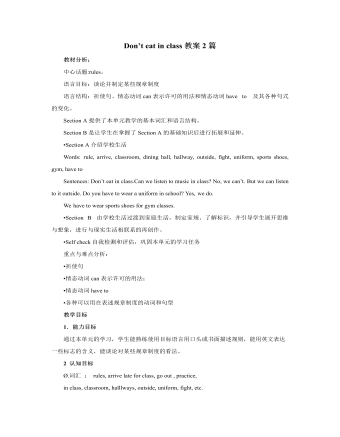
人教版新目标初中英语七年级下册Don’t eat in class教案2篇
Don’t fight. =You can’t fight. (板书,教读)教师把这些句子板书在黑板上,并请学生大声整齐地读祈使句和“can’t”句型,并让学生注意两种句型表达形式的不同和转换,“Don’t …=You can’t…”;并对学生说:These are our school rules. (板书,教读) You can’t break the school rules. Don’t break the school rules.(板书,教读)步骤3 :Practicea. T: Now, each of the students is breaking one of these rules.Please finish 1a.学生看图,完成1a的内容,检查答案并大声朗读校规。b. 听录音,完成1b,选出四位学生都违反了哪条校规;听之前,学生要读会英文名。c. 请两位学生朗读1c部分的句型;要求学生两人一组对话表演,SA扮演外校转来新生,SB告知本校校规。(学生可经过讨论,多说出他们想到的校规,不必只限于书上;教师应给予帮助)2) 第二课时(2a~4)步骤1 :warming up of revisionT: What are the rules at your school?学生使用“can”或祈使句表达各条校规;其中老师可引出“eat in the cafeteria outside”的表达。步骤2 :Practicea.T: Christina is an exchange student. She doesn’t know the rules. Let’s listen, what activities they’re talking about?学生听第一遍时,完成2a;第二遍时,完成2b;b. 请学生领读2c部分,看着2a完成的表格,理解2c活动的要求;分成小组针对2a进行问答;
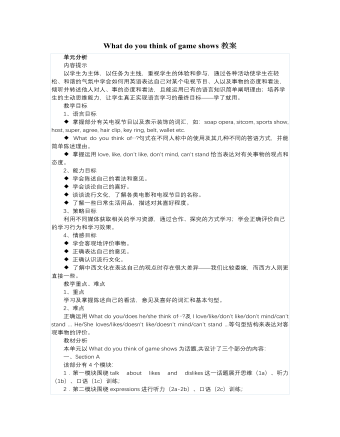
人教版新目标初中英语七年级下册What do you think of game shows教案
五、教学Section B-2c1. Pair work: What do you think of the belt/sunglasses/…? What does your father/mother/… think of your scarf/belt…?2. Group work(1). Teacher shows some different kinds of school uniforms (制服)and asks : “ What do you think of your school uniforms? If you have a chance to choose your school uniforms, what kind would you like to choose?”(2). Discuss in groups.(3).Get some Ss to report in class.说明:这一步旨在让学生运用已有的语言知识谈论对事物的看法和意见,并简单阐明理由,培养学生的主动思维能力和运用英语的能力。六、教学拓展调查电视节目的收视率任务:调查你周围的人对现在各种电视节目的反响。活动过程:1.教师布置任务,让学生调查周围的人(包括他的亲戚朋友和邻居)喜欢收看哪方面的电视节目。2.学生进行调查活动,运用本单元所学的句型What do you think of….? (Why?)What's your favorite game shows?What do you think of talk show?I doesn’t mind it.I like it.I love it.I can’t stand it.3.记录下排在前10位的TV Program,填写调查表,比较其收视率。
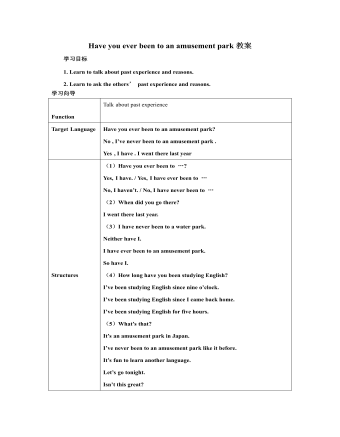
人教版新目标初中英语八年级下册Have you ever been to an amusement park教案
(1)Have you ever been to …? Yes, I have. / Yes, I have ever been to …No, I haven’t. / No, I have never been to …(2)When did you go there? I went there last year. (3)I have never been to a water park. Neither have I. I have ever been to an amusement park. So have I. (4)How long have you been studying English? I’ve been studying English since nine o’clock. I’ve been studying English since I came back home. I’ve been studying English for five hours. (5)What’s that? It’s an amusement park in Japan. I’ve never been to an amusement park like it before. It’s fun to learn another language. Let’s go tonight. Isn’t this great?space museum, amusement park, water park, South America, Peru, Holland, European culture, tour guide, flight attendant, musical instrument, more than, be from, get to, take lessons, neither, discover, graduate, change

人教版新目标初中英语八年级下册It’s a nice day, isn’t it教案2篇
"Hello! Welcome to English class! Introduce yourself. Meet your new classmates." That's what the teacher says. What do you say? "Oh no!" It can be difficult talking to new people. But it can be fun, and you can make friends. How do you do it? Make small talk. Small talk is polite conversation. "Wang Nan is a great pingpang player, isn't she?" "I'd love to meet her, wouldn't you?" "It's been raining a lot, hasn't it?" Tag questions are a form of polite speech. To make small talk successfully, you should know how to make them. You should also know what topics to talk about. Try to learn this unit carefully. The next time you're in English class, you'll find out. Making small talk's easy, isn't it? (“你好!欢迎你!请做一下自我介绍。认识一下你的新同学。”通常在课上老师会这样说。你会说什么呢?“噢,不!”与陌生人谈话太困难了。但是这也很有意思,并且你还能交到朋友。你该怎么做呢?闲聊。闲聊指得是礼貌的对话。“王楠是一个很棒的乒乓球运动员,不是吗?”“我希望自己能认识她,你呢?“今年的雨水很多,不是吗?”反意疑问句是一种礼貌用语。为了使得谈话成功,你应该知道怎样去进行闲聊。你还应该知道与不同的人该谈论什么样的话题。认真的学习这个单元吧,下次在英语课上,你会发现与大家展开谈话是一件很容易的事情,不信我们来试试。)

人教版新目标初中英语八年级下册He said I was hard-working教案2篇
This activity introduces some new vocabulary and provide oral practice using the target language.Task 1 . Ask four students to stand in front of the class, and the teacher asks them the following questions as a reporter.1.What are you going to do when you grow up?2.What are you going to do next week?3.What are going to do after school?The students will give different answers, then ask a good student to report what they said.I am going to e a doctor.What did she say?----------She said she was going to be a doctor.I am going to have a party on Friday night.What did he say?-------He said he was going to have a party on Friday night.I am going to do my homework.What did she say ?------ She said she was going to do her homework.I am going home after school.What did she say?-----She said she was going home after school.Say In this unit we are going to learn to use words like to report what someone said.Task 2. Read the instructions. Then ask a student to read the four questions. And write the words on the Bb. Explain what soap opera is.Task 3. Ask the students to Look at the pictures, point out the TV screens in the picture. Ask one girl to read what Marcia said.What did Marcia say? She said She said she was having a surprise party for Lana on Friday night. Repeat the other pictures in the same way.Activity3. Listen and number the pictures in activity 1a.

人教版新目标初中英语八年级下册What were you doing when the UFO arrived教案2篇
(一).知识方面: 1.培养学生能运用过去进行时来描述、谈论过去某个时间正在发生的事情或动作的意识和能力,能就过去某个时间正在发生的动作做出正确的描述。 2.培养学生的想象力和角色扮演的合作能力。 3.培养学生讲述过去发生的事情经过的能力。能正确运用一般过去时来讲述故事。 (二).技能方面: 1.本单元的语言目标是Talk about past events and tell a story(谈论过去的时间和讲述一个故事),围绕这一目标,要涉及句型: What were you doing when the UFO arrived? ----I was sitting in the barber’s chair. The barber was cutting my hair. 因此必须学习standing、studying、cleaning、sleeping、cooking、making、eating、cutting、等表示地点的词,以便为上述句型提供语言材料。2.学习过去进行时的有关知识。Was/were+现在分词,是该时态的表达式。 3.在学习过程中,要区分The boy was walking down the street when the UFO landed.和While the boy was walking down the street, the UFO landed.这两种由when和while引导的状语从句的句型结构。注意它们的不同。
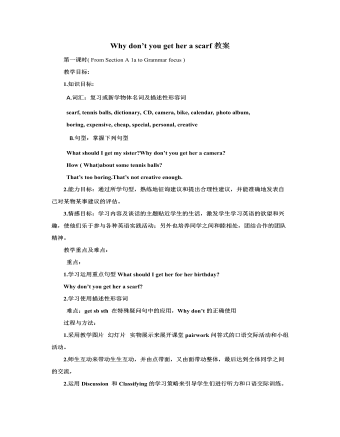
人教版新目标初中英语八年级下册Why don’t you get her a scarf教案
教师带领学生复习有关描述宠物的词汇,采用教师提问学生回答的方进行。如:T:What animals do you think would be good pets?What animals do you think would be bad pets?What do you think are good animals for a six-year-old child?然后学生进行 pairwork 练习。Task two: 师生互动,学习探究 1、播放3a部分的录音,引导学生一边听录音,一边跟读。2、通过听录音学生回答以下问题:Why do you think pot-bellied pigs are popular?What are the advantages and disadvantages of keeping such a pet?教师对学生的回答进行及时点评。3.学习范文,学习重点短语,为下步的模仿写作提供语言素材。T :1. )Have you ever kept a pig as a pet?Do you like pigs? St.:No.…Why don’t you like to keep a pig? St: No.They’re too dirty and lazy(Do you know in some foreign countries like Hollyland, Australia,pigs are the most popular pet.there’s a kind of pig.(图)it has an interesting name? it ‘s called a pot-bellied pig.) Now,let’s learn an article about this kind of interesting pet.2.)play the tapeSt.:Listen and repeat3.)show some Qs on computer(本子St.: read silently,then answerthe Qs(本子)4.)Ask ss. Close book and retell this passage.(what is a pot-bellied pig? Is it a good or bad pet? ) St.: retell it to each other“A pot –bellied pig is a popular pet now…”5.read the article together.St.:.practice reading
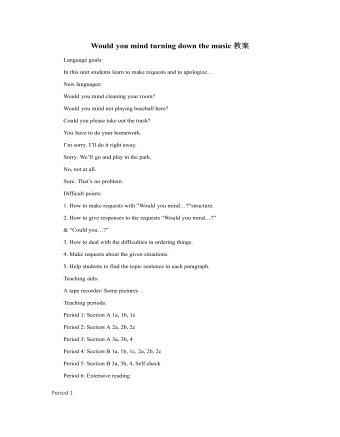
人教版新目标初中英语八年级下册Would you mind turning down the music教案
Step 4. Group work (4)1. Ask a pair of students to read the dialogue. Say, This activity provides speaking, listening and writing practice using the target language.2. Ask students to complete the work in groups.3. Check the answers with the whole class. 4. Explain some of the language points. Step 5. Word review (Self check 1)1. Ask students to read the words and the phrases given. 2. Fill in the blanks with proper forms of these words to complete the sentences. 3. Check the answers with the whole class. Homework:Do activity 2 on page 57 after class. Period 6Teaching aims: 1. Teach vocabulary words and the useful expressions. 2. Enable the students to learn etiquette in different culture. 3. Help the students learn how to behave politely in public places and in daily life. Teaching procedures:Step 1. RevisionHelp students to review the function of making requests through a free talk. Then lead them to the topic of etiquette. Explain the meaning of etiquette. Or, ask students to look it up in the dictionary. Step 2. Pre-reading (Section 1)1. Ask students to read the picture and make a list with their partner about how many rules of etiquette can be seen being broken.

人教版新目标初中英语九年级下册Rainy days make me sad教案
1. 教材分析本单元以how do things affect you?为话题, 从颜色、天气、音乐、广告、产品等方面谈论了外界事物如何影响人的心情。要求学生掌握表达某物或某事给人带来的感觉、看法或影响等。共设计了四个部分的内容:Section A 该部分有4个模块:第一模块围绕Which restaurant would you like to go to?这一话题展开思维(1a)、听力(1b)、口语(1c)训练;第二模块围绕How does music affect you? 进行听力(2a-2b)、口语训练(2c);第三模块继续围绕how do colors in the restaurant affect you这一话题展开训练,训练形式为阅读和问题体验(3a)和小组活动(3b);第四模块仍就How do things affect you这一话题以调查的形式展开讨论。Section B该部分有4个模块:第一模块围绕产品广告对人们的影响这一话题以“配对”(1a)与“列举”(1b)两种形式展开训练;第二模块继续围绕How do things affect you? 进行听力(2a-2b)、口语对话训练(2c);第三模块围绕“Advertising”这一话题展开阅读(3a-3b)和写作(3c)训练;第四模块围绕How posters affect you这一话题以口语训练形式展开小组活动。

人教版新目标初中英语九年级下册I’ll help clean up the city parks教案
Talk about offering help (P60)I’ll help clean up the city parks.A: I’d like to work ...B: You could help ...Talk about ways to tell people about the Clean-Up Day (P61)We need to ...We can’t ...I’ll ...Talk about the work the volunteers do (P62)These three students all volunteer their time to help other people.Somebody loves to ... / helps ... / plans to ... / wants to ...A: What do you like doing?B: I like ... A: What kind of volunteer work do you think I could do?B: You could ...1. 重点词汇advertisement, fix, repair, pleasure, blind, deaf, shut, carry, specially, fetch2. 认读词汇hunger, homeless, cheer, clean-up, sign, establish, major, commitment, elementary, veterinarian, coach, similar, call-in, strategy, disabled, organization, unable, support, appreciate, donation, part of speech, pronoun, adverb, preposition, conjunction, donate, Jimmy, Sally3. 词组clean up, cheer up, give out, put off, set up, think up, take after, fix up, give away, put up, hand out, work out, at once





